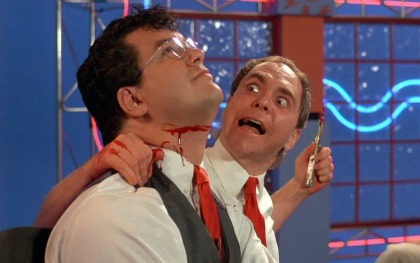Primary navigation


Barely seen in this country, Penn & Teller Get Killed more than earns its place in the oeuvre of its director, the late Arthur Penn, says Brad Stevens
Aside from a handful of screenings in the early days of Sky Movies, Arthur Penn’s Penn & Teller Get Killed (1989) has never been distributed in the UK. To an extent this is understandable, since the film is essentially a star vehicle for two unconventional magicians – Penn Jillette and Teller (the latter a silent Harpo to the former’s Groucho) – who were then virtually unknown outside North America. Yet this unclassifiable oddity is more interesting when seen from an auteurist perspective.
Many film-makers associated with America’s 1970s cinematic renaissance had trouble sustaining their careers in subsequent decades, but the disappointment of the post-1970s output of Arthur Penn (who died in September – see our obituary) is especially puzzling, in that it seemed reasonable to expect so much more from him. Following the flawed but ambitious Four Friends (1981), he tended to undertake only half-hearted commercial assignments and television projects. The sole directorial credit during the last 14 years of his life was an episode of Sidney Lumet’s courtroom TV series 100 Centre Street.
Penn & Teller Get Killed is certainly the finest of Penn’s films from this period, partly because it so starkly illustrates the dilemma at the heart of his oeuvre. Initially Penn’s focus was on young people in conflict with ‘fathers’ who represented traditional authority – Billy the Kid (The Left Handed Gun, 1958), Bonnie Parker and Clyde Barrow (Bonnie and Clyde, 1967), Arlo Guthrie (Alice’s Restaurant, 1969) and Jack Crabb (Little Big Man, 1970) all being opposed to parental figures intent on suppressing their vitality.
Yet even as early as The Miracle Worker (1962), Penn was expressing the view that parental control of youthful energy might, in certain situations, be a desirable thing. And what’s striking about Penn’s later work is the way in which his sympathies increasingly came to focus on the fathers rather than the sons. Taken in one direction, this shift of emphasis leads inevitably to conservatism; indeed Target (1985), in which a son (Matt Dillon) learns to respect a father (Gene Hackman) revealed to be in possession of a hitherto concealed castrating power, is an archetypal Reaganite text. But the key film here is The Missouri Breaks (1976), wherein Marlon Brando’s regulator Lee Clayton is both castrating patriarch and anarchic rebel.
Penn & Teller Get Killed might be described as the film in which Brando’s character moves centre stage. The plot involves two magicians – Penn and Teller, playing themselves (they also wrote the screenplay) – who take turns trying to top each other with a series of increasingly elaborate and sadistic practical jokes, culminating in that inevitable event anticipated by the title. Penn (Jillette) and Teller clearly have a great deal in common with Penn (Arthur)’s earlier youthful protagonists. But whereas Billy, Bonnie, Clyde, Arlo and Jack were struggling against societies bent on suppressing their acts of rebellion, Penn and Teller’s deadly games meet with no opposition from any quarter, such authority figures as exist functioning merely as unwitting assistants to various gags (such as the guard at the airport who obliges Penn to remove his clothes while Teller repeatedly sets off a metal detector).
The tone curiously recalls the post-apocalyptic feel of Marco Ferreri films, in which unreconstructed males pursue their self-defeating obsessions in a vacuum, playing childish games amid the rubble of collapsed civilisations. Like Lee Clayton, Penn and Teller combine the roles of oppressive father and rebellious son, but do so in a world where both roles have ceased to be meaningful. With nothing left to rebel against, they rebel against themselves; with nobody else to oppress, they oppress each other. The fathers these characters might previously have expended their energies combating are conspicuous by their absence, the idea of the father as source of authority being evoked only towards the end as the bitterest of black jokes, in the form of a cop on the verge of retirement who discovers Penn and Teller’s corpses, and promptly commits suicide.
This probably makes the film sound relentlessly dour, yet nothing could be further from truth. Like Robert Altman’s O.C. and Stiggs (1985), another lost auteur oddity from the 1980s, Penn & Teller Get Killed revels in an atmosphere of consequenceless amusement, haunted by the intermittent realisation that its fun-loving heroes are really intolerable monsters. And this split personality, connecting as it obviously does with the director’s increasing uncertainty concerning which side of the Oedipal conflict he should be on, functions on several levels (the film was even split between two studios, starting at Lorimar and ending up at Warner Bros) – which explains why what could have been Penn’s most commercial project ended up closely resembling his defiantly uncommercial Mickey One (1965), another study of a nightclub performer on the run through a hazily defined American landscape.
Interviewed in Projections 4 (Faber and Faber, 1995), Penn admitted: “I had a funny, cartoonish movie in mind and I didn’t do it. I should have done it way outside of unions and all that stuff. It should have been much wilder.” Yet if Penn & Teller Get Killed is infused with studio gloss, its sparse distribution has ended up giving it precisely that disreputable, marginal quality its creator was hoping for.
I first saw the film on a third-generation VHS tape with Greek subtitles, and it’s currently available in the US only as a Warner Archive DVDR, an honour reserved for items from the back catalogue considered too obscure for legitimate DVD release. Oh, and at the time of writing it can also be seen on YouTube (in nine parts). An appropriate fate for a work whose fascination lies precisely in its inability to ‘position’ itself more neatly.
Arthur Penn, 1922-2010: Peter Biskind’s obituary of the film, theatre and television director and frontiersman of the 1970s New Hollywood (October 2010)
Gangsters special: thunder roads: Michael Atkinson on the American New Wave’s nostalgia for the gangster films of the Great Depression (August 2009)
Giant steps: David Thomson on the uncompromising mavericks who took over 1970s Hollywood (September 2006)